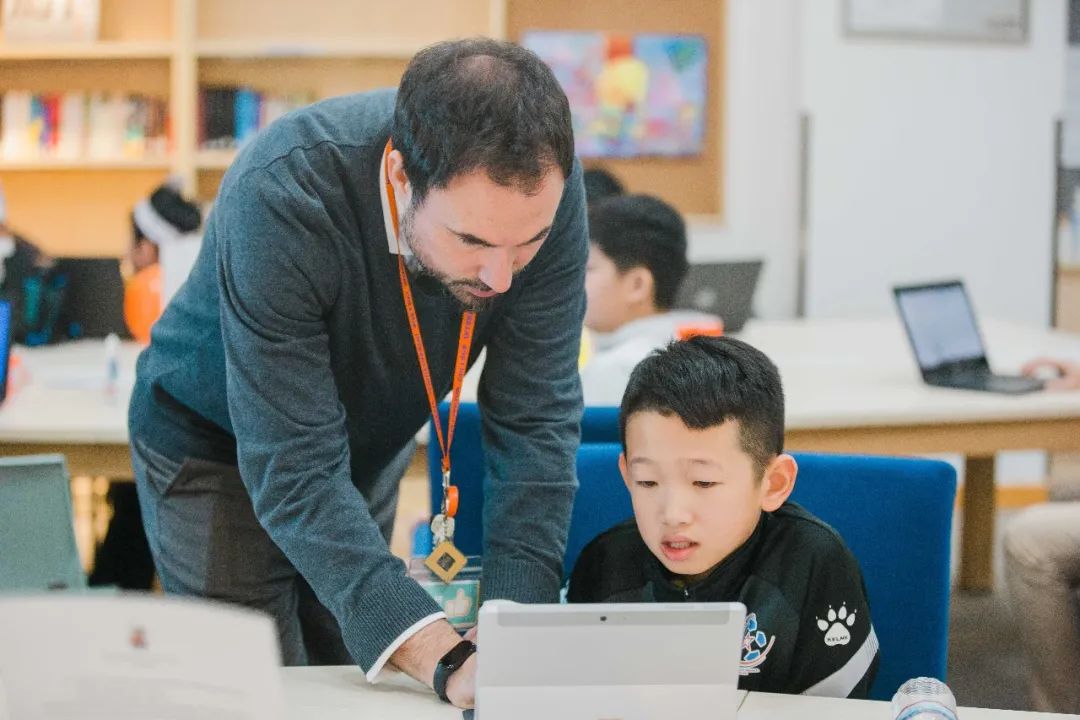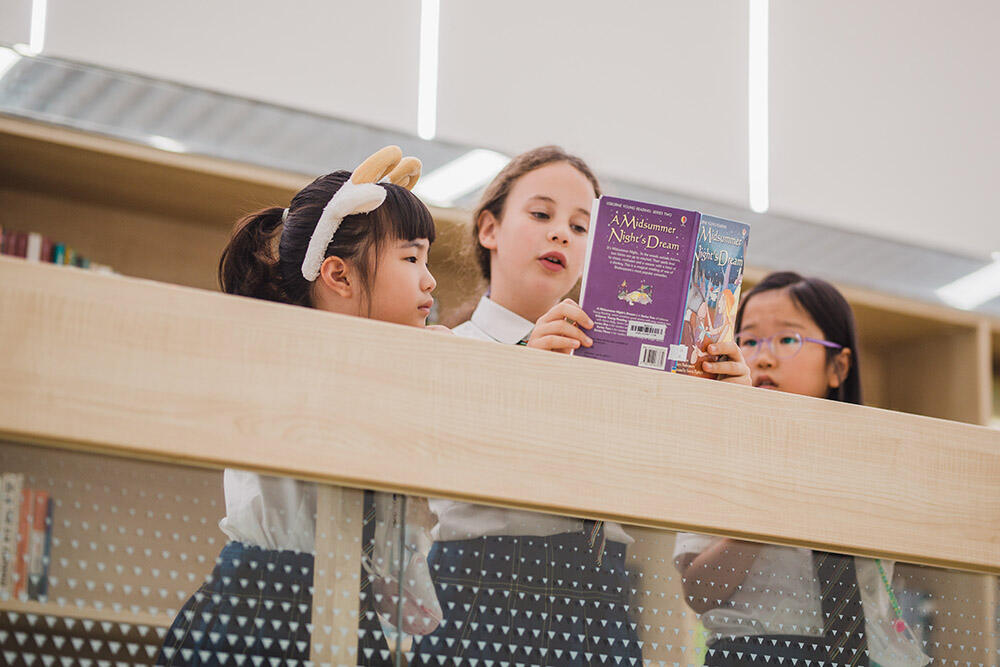Educational Insights丨Safe Internet Use at Home

Toby Roundell
Pastoral & Safeguarding Lead
In my last article I presented five principles to help support you in managing your child’s screen time and device usage. One important factor I articulated was the need to get ‘buy in’ from your child around the expectations and consequences of their online behaviour. I suggested investing time in making a family agreement. Today’s article explains what a family agreement is, why it is important, and how to go about making one.

What is a family agreement?
A family agreement is a really useful construct for having positive conversations around safe internet usage, encouraging positive behaviours online and for establishing clear expectations and boundaries with your child.
Why have a family agreement?
As we all know, managing children’s (and our own) device usage and the intake around all things virtual is deeply challenging, and can cause considerable conflict at home. Also, if done wrong it can result in broken relationships, underperformance in studies and a submergence into low levels of well-being and mental health. Furthermore, lack of openness can also lead to dangerous practices online that can drift, sometimes very quickly, into child protection and safeguarding issues that are every parent’s nightmare. Getting transparency and establishing a clear set of boundaries is therefore a very important responsibility for parents and I need to add it’s not a one-off process. You will need to revisit your agreements annually to keep them relevant and responsive. But before that, you need to get your first agreement completed.

How do we make a family agreement?
A family agreement is a set of positive promises that you and your child together have created. They establish how you wish to look after each other online and how you, as a family, treat others online. There are seven key areas to consider when constructing a family agreement and I will briefly outline them below:
Stage
1
Begin at the beginning
As a family, it is a good idea to sit down and have a conversation around the things each member enjoys doing online: the apps, games and websites most used; and the devices you each use. This is a sort of mini audit that can be highly instructive – in fact I am sure you will find out things about each other that you never knew before. The key to this process working is setting a safe space that enables open discussion, not being judgemental when a controversial area is raised and keeping the purpose of the activity explicit. You, as a family, are preparing the ground for an agreement and a set of promises that will establish how you wish to look after each other online!

I’d suggest bringing all this information together on a big piece of paper and having a really positive conversation around it. Furthermore, I’d suggest discussing any current rules you have in place so their relevant merits can be considered as you begin to shape your agreement.
Stage
2
Managing the time factor
At this stage you are going to reflect, as a family, on how much time you spend on devices, websites, social media, apps, games, work etc. This could be quite fun because I am pretty sure if you are a family of four, when you consider the hours spent in a day on devices it will probably break through the 24hr category! I just want to add that when I was the age of my children the amount of time my family spent on devices per day was 0 hours – which really shows how much life has changed,. Nevertheless, musings aside, further questions you can discuss are:
-
How does it feel when you have overindulged for a day on a device?
-
What are the signs that the device usages may be impacting your family relationships? (think mealtimes for example).
-
As a family, what actions could you take that would give some quick wins and get the hours down?

Stage
3
Sharing is Caring
Decisions around sharing are important for they have wider implications if not well defined and can lead to damaged family reputations, legal challenges against an individual, and a range of other unpleasant consequences that no family wants to work through.
The first point of refence is around sharing of devices, accounts and personal information. Here are some questions for you to consider:
1. How do you keep personal information, both for yourself and for family members, safe?
2. What email accounts are in use by family members, which accounts are used to sign in to apps or programmes that others in the family use?
3. How are privacy settings set? What are the standards you want as a family? How strong are passwords? Could a breach of one account impact all members in the family?

There is, of course, the other side of sharing - what you post online. Key points for consideration can include:
1. What are the expectations around use of language in posts, WeChat moments and personal messages?
2. What is okay to share online? What is not okay to share online? What should you do if you are unsure?
3. What do you need to do before posting images or videos online?

At an age-appropriate level, framing some of the above questions around the future, especially university entrance and employability, can be constructive. Also, being very clear that if something is posted (even if it is in a personal message) it is forever in the virtual world and could reappear at an inopportune time. You no longer own it from the moment you post it! As I mentioned in my previous article a good foundation for posting is applying the College’s values: Is what I am about to post, responsible, respectful and kind? Also, the THINK anagram is also useful:
Before you post:

Stage
4
Consuming content
The exercise in stage 1, where as a family, you identified the websites, games and apps you use, feeds seamlessly into stage 4. Content is primarily about what we engage in when we’re online. What is important to realize is that content influences! It influences opinions, influences decisions, influences beliefs and influences life trajectories. So as a parent a good question to perhaps reflect on is who online is shaping your child’s future? If you met these people in real life would you want your child spending the equivalent time with them face to face as they do online? If not, why not?
As a family, some further key questions worth exploring that emphasize responsibility (a College value) include:
-
Do you know the age requirements or rating for games and apps you purchase? Do you respect these guidelines? If not, on what basis do we decide to ignore them?
-
Are you clear as a family, what you should do if you see something that concerns you, that looks unreliable, that gives you a feeling that something is wrong?
-
When is it okay to download files from links, and when is it not?
Stage
5
Communicate, communicate, communicate!
For those who have a background in England the above mantra will resemble the promulgation of New Labour in the late 1990s: “Education, Education Education”. A big difference though is that “communicate” is a verb and thus and action! And when we take an action, we are charged with responsibility for the action. So with things that deal with communicating online the below questions are well worth pondering together:
1. Who can you talk with, chat with, and play games with online? Does it matter if you don’t know them offline? If not, why not? What indicators in online interactions may be warning signs
2. What steps can you take to keep yourselves safe if you are communicating with people you do not know offline?
3. How can you be a good friend when you are online?

Stage
6
If things go wrong
Things do go wrong. And in truth they probably go wrong a lot more than we realise. Many of the troubles can be cleared up with a reestablishment of values and boundaries but there are times when behaviour online tips into areas that can be disturbing and destructive. Cyber bullying, enormous peer pressure that leads to peer on peer abuse, online grooming, bribery, the list goes on. These are all terrible, terrible experiences that can damage young lives indefinitely. So, as a family what can you do to support each other from these very real threats. Conversations with your child about simple steps they can take when things feel, or go wrong are important so that they know they can turn to you, or to a trusted adult, in times of trouble:
1. If you see or hear something that upsets you or disturbs you what can we do? Who can you speak with?
2. What should you do if someone asks for personal information, a photo, or ask to meet up (especially if we have never met them before)?
3. What should your child do if they have sent a photo or something similar and now feel vulnerable, or just uneasy about it? How do you communicate to them that you have the courage to listen, believe and support them without judging them in such situations?
4. Do you all know how to block and report websites or content that needs to be addressed in such way?

Stage
7
The final stage
Establishing an agreement is empowering to every member of the family. Also, children, if they are involved in the process of making the agreement, and if their views are listened to, will take it very seriously. There is strong evidence that supports this. So to wrap up:
-
Name who is responsible for the promise.
-
Be clear when the promise starts
-
Be clear when you will next review the promises
-
Back up the promise, (so if it is broken, identify what the consequences are, their stages, and get agreement on this as a family)
-
Also consider positive consequences for exemplar behaviour online (and offline)
-
Make sure everyone in the family signs it (including the cat!) and that it is displayed in a prominent position in the home.
Finally, make sure that your child knows that if something does go wrong, that you will always listen, believe and support them and that they should not be concerned about consequences when their wellbeing or safety is in peril.
Conclusion
Family agreements are empowering. Although they may take a few hours or perhaps a couple of sessions to set the first time around, once you’ve established one and made a commitment to it, the review will be much easier. And hopefully the online outcomes will be really positive for you all. The key to its success is that (i) both adults and children are open to changing their online behaviour as a result of the agreement; (ii) that the agreement is focused on the positive; (iii) that it is workable for the whole family; and (iv) that you review it at least annually.
If you would be interested in attending a family agreement workshop as a whole family (i.e. mum, dad and child(ren)) please drop tina.bai@wellingtoncollege.cn an email and the College will consider possible options in providing a workshop this academic year.
Related Articles







 Channel
Channel 
 Linkedin
Linkedin  Facebook
Facebook  Ins
Ins 





